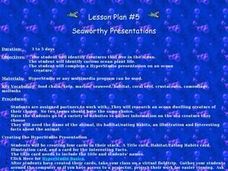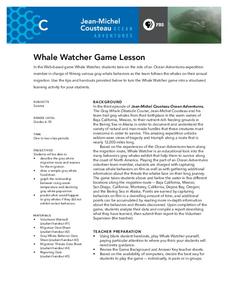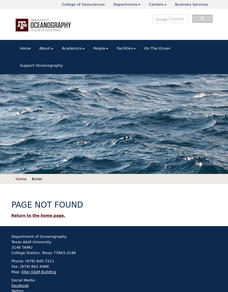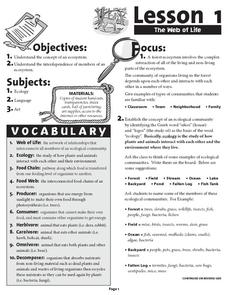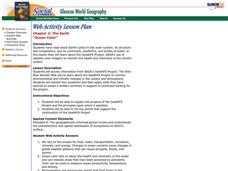Curated OER
Food Web Mystery
Students describe typical marine food webs, and explain why food is generally scarce in the deep-ocean environment. They discuss reasons that seamounts may support a higher density of biological organisms than would appear to be possible.
Curated OER
9th Grade
Ninth graders discuss the principal source of energy entering the marine ecosystem. They name some of the autotrophs at the Maui Ocean Center. Students name some of the heterotrophs at Maui Ocean Center. They are taught that plants are...
Curated OER
Seaworthy Presentations
First graders research ocean animals and plants on the web. In this ocean habitat lesson plan, 1st graders prepare a multimedia presentation. Students will work on their presentations in pairs and every group should have its...
Curated OER
Energy Through the Ecosystem
In this ecosystem worksheet, students use a diagram of an ocean-based food web to complete 5 short answer questions about the energy flow through this ecosystem.
Curated OER
Water is Life
Krill is a very small ocean animal that is key to keeping the ocean ecosystem going. The class reviews food webs and chains, learns about the importance of krill, discusses krill anatomy, builds a model of a krill, and then has a...
Curated OER
Wild Arctic
Young scholars explore key terms, including food web and food chain. They discuss Arctic plants and animals, devise at least three Arctic food chains and create a food web showing connections among Arctic life.
Curated OER
Tracking Ocean Ecology
Students look at the data maps given to them about how chlorophyll affects the algae blooms and make predictions about the harm they will cause. In this data maps lesson plan, students manipulate data sets from the website.
Teach Engineering
The Great Pacific Garbage Patch
The Great Pacific Garbage Patch is one of several garbage patches around the world where garbage accumulates naturally. As part of a GIS unit that combines oceanography, environmental science, and life science, class members investigate...
Curated OER
Lesson 9 - Along Our Coast
Students study the benefits of estuaries. They construct a saltwater food web, and complete worksheets and a quiz.
Curated OER
Whale Watcher Game Lesson
Learners study the gray whale migration and compare their populations to the increasing ocean temperature. In this whale watcher lesson students draw a food chain.
Curated OER
Fisheries
High schoolers research and report on the ocean's problems of disappearing or diminishing species around the world. students examine ecosystems and food chains and present their findings to a mock panel of science experts.
Curated OER
Along Our Coast
Students explore the coast lines of Florida. They examine the benefits of estuaries and examine the estuary systems found along the coast. Students research and construct a saltwater food web.
Science Matters
That’s An Otter Story
Young scientists discover how sea otters' habitats have changed due to human impact. Through conversation, video observation, and story reading, scholars identify how human interactions change a specific ecosystem in both positive and...
Curated OER
The Web of Life
Middle schoolers participate in a game in which they discover the balance of life in the ocean. They identify different organisms that rely on different types of food. They answer questions to complete the lesson.
Curated OER
Sea Connections
Students, after locating different marine habitats on a globe, play a card game about ecosystems, food webs and organisms.
Curated OER
Hawaii's Freshwater Animals - Species Report
Students explore biology by creating a report for the class. In this oceanography lesson, students research and identify the survival characteristics of a list of freshwater animals by utilizing the Internet and library. Students...
Curated OER
Coral Reefs Endangered
Students research where in the world coral reefs are located. In this ecology lesson, students create food chains and food web. They simulate growing coral reefs to understand their characteristics better.
Curated OER
Ocean Color
Students examine NASA's SeaWiFS Project Web site to explore how the SeaWiFS Project monitors environmental and climatic changes in the oceans and atmosphere. They answer questions and write a summary in support of continued funding for...
Curated OER
Empty Oceans
In groups of four, pupils brainstorm about seafood. They view the Monterey Bay Aquarium Seafood Watch website to examine the problems caused by the seafood industry. Learners are then brought back together to discuss what they...
Curated OER
Whales
First graders investigate two different types of whales; toothed and baleen. They describe what the different types of whale eat. They listen to a cassette of Dyan Sheldon's, The Whale Song before making stick puppets to dramatize the...
Curated OER
The Future of Arctic Sea Ice
Students research about the importance of sea ice to world climate and sea organisms. In this earth science lesson, students create a model of present and future Arctic sea ice communities. They discuss how ice melting affects...
Curated OER
Whale Watcher Game Lesson
Young scholars participate in an online whale watching game. They identify the reasons for migration and describe the route. They make predictions on what would happen if the ways did not migrate.
Curated OER
Squid Dissection
First graders participate in dissecting a squid. They identify and locate specific parts of a squid with teacher guidance. They draw a picture of what their squid looked like and label specific parts.
Curated OER
Something Fishy
Students identify and discuss the adaptive characteristics and behaviors of fish. They view slides of fish, and design and create a model of a fish of the future, listing the ways their fish adapt to survive.




